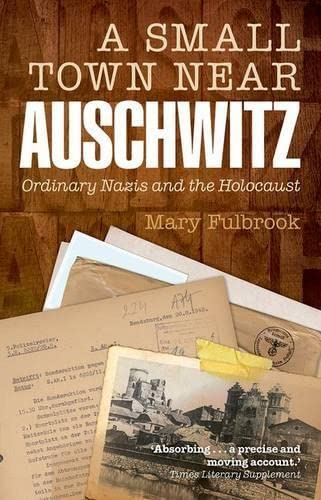

Most ebook files are in PDF format, so you can easily read them using various software such as Foxit Reader or directly on the Google Chrome browser.
Some ebook files are released by publishers in other formats such as .awz, .mobi, .epub, .fb2, etc. You may need to install specific software to read these formats on mobile/PC, such as Calibre.
Please read the tutorial at this link. https://ebooknice.com/page/post?id=faq
We offer FREE conversion to the popular formats you request; however, this may take some time. Therefore, right after payment, please email us, and we will try to provide the service as quickly as possible.
For some exceptional file formats or broken links (if any), please refrain from opening any disputes. Instead, email us first, and we will try to assist within a maximum of 6 hours.
EbookNice Team

Status:
Available5.0
11 reviews
ISBN 10: 0199679258
ISBN 13: 9780199679256
Author: Mary Fulbrook
The Silesian town of Bedzin lies a mere twenty-five miles from Auschwitz; through the linked ghettos of Bedzin and its neighbouring town, some 85,000 Jews passed on their way to slave labour or the gas chambers. The principal civilian administrator of Bedzin, Udo Klausa, was a happily married family man. He was also responsible for implementing Nazi policies towards the Jews in his area - inhumane processes that were the precursors of genocide. Yet he later claimed, like so many other Germans after the war, that he had 'known nothing about it'; and that he had personally tried to save a Jew before he himself managed to leave for military service. A Small Town Near Auschwitz re-creates Udo Klausa's story. Using a wealth of personal letters, memoirs, testimonies, interviews and other sources, Mary Fulbrook pieces together his role in the unfolding stigmatization and degradation of the Jews under his authoritiy, as well as the heroic attempts at resistance on the part of some of his victims. She also gives us a fascinating insight into the inner conflicts of a Nazi functionary who, throughout, considered himself a 'decent' man. And she explores the conflicting memories and evasions of his life after the war. But the book is much more than a portrayal of an individual man. Udo Klausa's case is so important because it is in many ways so typical. Behind Klausa's story is the larger story of how countless local functionaries across the Third Reich facilitated the murderous plans of a relatively small number among the Nazi elite - and of how those plans could never have been realized, on the same scale, without the diligent cooperation of these generally very ordinary administrators. As Fulbrook shows, men like Klausa 'knew' and yet mostly suppressed this knowledge, performing their day jobs without apparent recognition of their own role in the system, or any sense of personal wrongdoing or remorse - either before or after 1945. This account is no ordinary historical reconstruction. For Fulbrook did not discover Udo Klausa amongst the archives. She has known the Klausa family all her life. She had no inkling of her subject's true role in the Third Reich until a few years ago, a discovery that led directly to this inescapably personal professional history.
1. Legacies of Violence
2. Będzin before 1939
3. Border Crossings
4. The Making of a Nazi Landrat
5. An Early Question of Violence
6. ‘Only Administration’
7. Means of Survival
8. Escalation, 1941–1942
9. Towards Extermination
10. The Deportations of August 1942
11. Ghettoization for the ‘Final Solution’
12. Final Thresholds
13. Afterwards and After-Words
Tags: Mary Fulbrook, Auschwitz, Ordinary